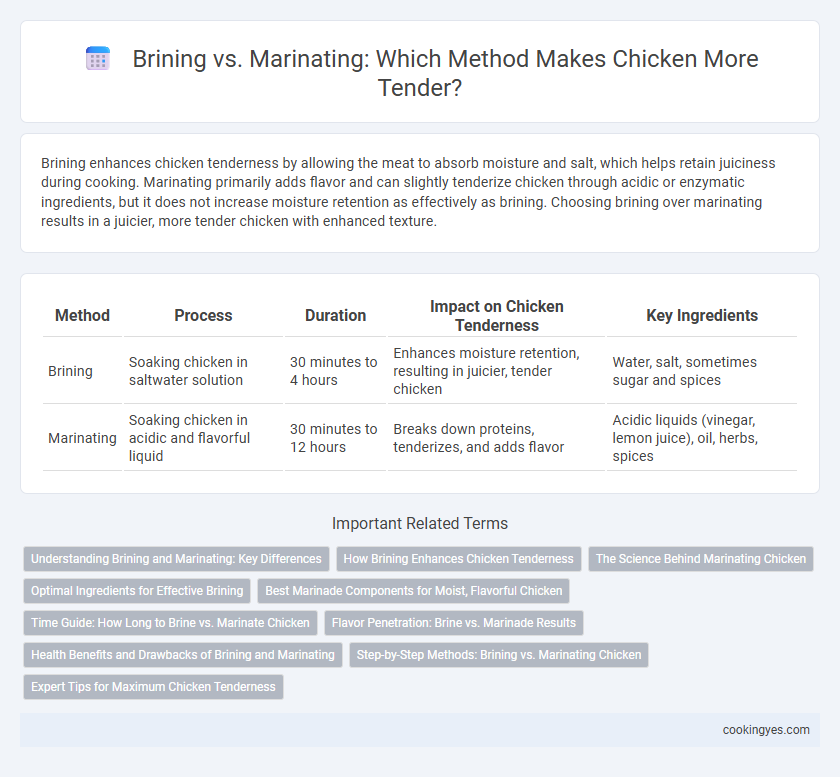Brining enhances chicken tenderness by allowing the meat to absorb moisture and salt, which helps retain juiciness during cooking. Marinating primarily adds flavor and can slightly tenderize chicken through acidic or enzymatic ingredients, but it does not increase moisture retention as effectively as brining. Choosing brining over marinating results in a juicier, more tender chicken with enhanced texture.
Table of Comparison
| Method | Process | Duration | Impact on Chicken Tenderness | Key Ingredients |
|---|---|---|---|---|
| Brining | Soaking chicken in saltwater solution | 30 minutes to 4 hours | Enhances moisture retention, resulting in juicier, tender chicken | Water, salt, sometimes sugar and spices |
| Marinating | Soaking chicken in acidic and flavorful liquid | 30 minutes to 12 hours | Breaks down proteins, tenderizes, and adds flavor | Acidic liquids (vinegar, lemon juice), oil, herbs, spices |
Understanding Brining and Marinating: Key Differences
Brining involves soaking chicken in a saltwater solution to increase moisture retention and enhance tenderness by breaking down muscle proteins. Marinating uses acidic ingredients like vinegar or citrus combined with herbs and spices to infuse flavor and tenderize through enzymatic activity. Understanding these key differences helps optimize chicken texture and taste based on cooking methods and desired results.
How Brining Enhances Chicken Tenderness
Brining enhances chicken tenderness by allowing the meat to absorb a saltwater solution, which increases moisture retention during cooking. The salt in the brine breaks down muscle proteins, resulting in a juicier and more tender texture. This process is especially effective for lean cuts like chicken breasts, reducing dryness and improving overall flavor absorption.
The Science Behind Marinating Chicken
Marinating chicken involves soaking the meat in an acidic solution containing ingredients like vinegar, lemon juice, or yogurt, which breaks down protein structures and enhances tenderness. Enzymes and acids in the marinade penetrate the muscle fibers, causing them to unwind and retain moisture during cooking. This process not only improves texture but also infuses the chicken with flavors, making it juicier and more succulent compared to unseasoned meat.
Optimal Ingredients for Effective Brining
Effective brining for chicken tenderness relies on a balanced solution of water, salt, and sugar, where kosher salt or sea salt enhances moisture retention by breaking down muscle fibers. Adding aromatics like garlic, herbs, and spices infuses subtle flavors while maintaining the meat's juiciness. Optimal brining time ranges from 30 minutes to several hours, depending on chicken size, ensuring maximum tenderness without over-salting.
Best Marinade Components for Moist, Flavorful Chicken
Using a marinade with an acid base like lemon juice or vinegar helps break down chicken proteins, enhancing tenderness and flavor absorption. Incorporating oil, herbs, garlic, and spices creates a balanced mixture that locks in moisture while infusing the meat with vibrant taste. A well-formulated marinade paired with proper marinating time ensures juicy, flavorful chicken that outperforms simple brining methods.
Time Guide: How Long to Brine vs. Marinate Chicken
Brining chicken typically requires 30 minutes to 4 hours depending on the cut size, allowing the salt solution to penetrate and enhance moisture retention for optimal tenderness. Marinating chicken varies from 15 minutes up to 24 hours, with acidic or enzymatic marinades breaking down proteins to improve texture and flavor absorption. Over-brining or over-marinating can negatively impact the chicken's texture, so following time guidelines based on size and marinade composition is essential for best results.
Flavor Penetration: Brine vs. Marinade Results
Brining enhances chicken tenderness by allowing salt to penetrate deeply, breaking down muscle proteins and retaining moisture, which results in juicier meat. Marinades, often acidic and infused with herbs and spices, contribute distinct surface flavors but generally do not penetrate as deeply as brines. The effectiveness of flavor penetration depends on the solution's composition and soaking time, with brines providing more uniform internal seasoning compared to marinade's stronger, localized taste.
Health Benefits and Drawbacks of Brining and Marinating
Brining chicken involves soaking it in a saltwater solution, which enhances tenderness by increasing moisture retention and evenly distributing salt; this can improve juiciness and flavor without adding extra calories or fat. Marinating includes an acidic component like vinegar or citrus juice, which tenderizes by breaking down proteins but may cause a firmer texture if overused and can introduce sugars or oils, affecting calorie content. Health benefits of brining focus on maintaining hydration and flavor with fewer additives, while marinating offers antioxidant benefits from herbs and spices but may increase sodium and caloric intake depending on the marinade composition.
Step-by-Step Methods: Brining vs. Marinating Chicken
Brining chicken involves soaking it in a saltwater solution, typically for 30 minutes to several hours, which enhances moisture retention and tenderness by allowing the meat to absorb and retain water during cooking. Marinating chicken requires submerging it in an acidic mixture containing ingredients like lemon juice, vinegar, or yogurt for 1 to 24 hours, which tenderizes the meat by breaking down proteins and adding flavor. Brining is ideal for moist and juicy texture without overpowering flavors, while marinating offers both tenderness and infused seasoning, with timing and ingredient balance crucial for optimal results.
Expert Tips for Maximum Chicken Tenderness
Brining chicken enhances tenderness by allowing the meat to absorb moisture and retain juiciness during cooking, typically involving a saltwater solution infused with herbs and spices. Marinating infuses flavor while tenderizing through acidic ingredients like lemon juice or vinegar that break down muscle fibers, but excessive acid can cause a mushy texture. For maximum chicken tenderness, experts recommend brining for at least 1-2 hours followed by a brief marinating period to balance moisture retention with flavor infusion.
Brining vs Marinating for Chicken Tenderness Infographic

 cookingyes.com
cookingyes.com